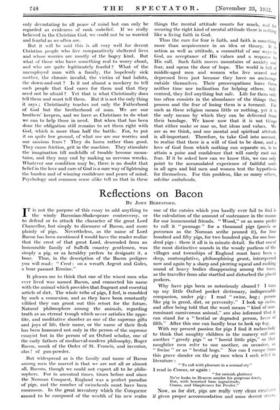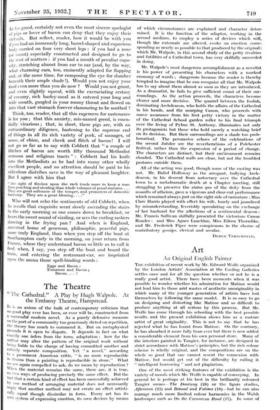Reflections on Bacon
BY JOHN BERESFORD.
TT is not the purpose of this essay to add anything to the windy Baconian-Shakespeare controversy, or to defend or to attack the character of the great Lord Chancellor, but simply to discourse of Bacon, and more plainly of pigs. Nevertheless, as the name of Lord Bacon has been mentioned I would have the reader realize that the crest of that great Lord, descended from an honourable family of Suffolk country gentlemen, was simply a pig, or as heraldry prefers to designate it, a boar. Thus, in the description of the Bacon pedigree you will read : " Crest : on a wreath Argent and Gales, a boar passant Ermine."
It pleases me to think that one of the wisest men who ever lived was named Bacon, and connected his name with the animal which provides that fragrant and essential article of diet. The whole tribe of pigs, I feel, is ennobled by such a connexion, and as they have been constantly vilified they can grunt out this retort for the future. Natural philosophers among the animals, regarding truth as an eternal trough which never satisfies the appe- tite, and meditative slumber as one of the supreme gifts and joys of life, their name, or the name of their flesh has been honoured not only in the person of the supreme essayist but in the person of an Oxford scholar, one of the early fathers of mediaeval-modern philosophy, Roger Bacon, monk of the Order of St. Francis, and inventor, alas ! of gun-powder.
But widespread as is the family and name of Bacon among men the marvel is that we are not all or almost all, Bacons, though we could not expect all to be philo- sophers. For in ancestral times, times before and since the Norman Conquest, England was a perfect paradise of pigs, and the number of swineherds must have been enormous. In the great inventory which the Conqueror eaused to be composed of the wealth of his new realm one of the entries which you hardly ever fail to find is the calculation of the amount of sustenance in the manor for our immemorial friends. "Wood," or as some prefer to call it " pannage " for a thousand pigs (porcis or porcoruin as the Norman scribe penned it), for four hundred and fifty pigs, for two hundred pigs, for one hun- dred pigs : there it all is in minute detail. So that one of the most distinctive sounds in the woody purlieus of the villages and townships of England must have been a deep, contemplative, philosophizing grunt, interspersed now and again by a sharp and piercing squeal and rushing sound of heavy bodies disappearing among the trees, as the traveller from afar startled and disturbed the placid porkers.
Why have pigs been so notoriously abused ? I turn up my little Oxford pocket dictionary, indispensable companion, under pig : I read "swine, hog ; person like pig in greed, dirt, or perversity." I look up srcine, and after being told that the word means "kind of non- ruminant carnivorous animal," am also informed that it can stand for a "bestial or degraded person, lover of filth." After this one can hardly bear to look up hog.
With my present passion for pigs I find it melancholy to think that naughty children in the nursery call one another "greedy pigs" or "horrid little pigs," or that naughtier men refer to one another, on occasion, as " Swine " or as "bestial hogs." Nor can I escape from this grave slander on the pig race when I seek relief in literature :
"To roll with pleasure in a sensual sty"
I read in Cams, or again :
"for swinish gluttony Ne'er looks to Heaven amidst his gorgeous feast, But, with besotted base ingratitude, Crams, and blasphemes his Feeder."
Now, as for dirt, pigs are really very clean creatures if given proper, accommodation and some decent straw. As fur greed, certainly not even the most sincere apologist of pigs or lover of bacon can deny that they enjoy their victuals. But reflect, reader, how it would be with you if you had an immensely long, barrel-shaped and capacious body carried on four very short legs : if you had a nose (or snout) especially constructed and designed to go to the root of matters : if you had a mouth of peculiar capa- city. stretching almost from ear to ear (and, by the way, what charming ears, too, eminently adapted for flapping and, at the same time, for composing the eye for slumber beneath their ample shade !). Would you not enjoy your food even more-than you do now ? Would you not grunt, and even slightly squeal, with the excruciating ecstasy of creamy, rich barley-meal as it entered your long and wide mouth, gurgled in your roomy throat and flowed on into that vast stomach forever clamouring to be soothed ?
Think, too, reader, that all this eagerness for sustenance is for you.; that this anxiety, mis-named greed, is essen- tially vicarious ; that, in short, these pigs are, with an extraordinary diligence, hastening to the supreme end of things in all its rich variety of pork, of sausages, of souse, of chine, and cheek and flitch of bacon ! I will not go so far as to say with Cobbett that "a couple of flitches of bacon are worth fifty thousand Methodist sermons and religious tracts " : Cobbett had his knife into the Methodists as he had into many other wholly excellent people, and no attention should be paid to his ridiculous diatribes Save in the way of pleasant laughter. But I agree with him that " the sight of flitches upon the rack tends more to keep a man from poaching and stealing than whole volumes of penal statutes.... They are great softeners of the temper, and promoters of domestic harmony. They are a great blessing. . . ."
Who will not echo the sentiments of old Cobbett, when he recalls that exquisite scent slowly ascending the stairs in the early morning as one comes down to breakfast, or hears the sweet sound of sizzling, or sees the curling rashers (lancing in the frying pan ? And when is England, ancestral home of generous, philosophic, peaceful pigs, "lore truly England, than when you step off the boat at Southampton early in the morning, on your return from France, where they understand bacon so little as to call it lard. when, I say, you step off the boat and board the train, and entering the restaurant-car, see imprinted Upon the menu those spell-binding words :
Eggs and Bacon ; Tomatoes and Bacon ; Bacon. . . ?







































 Previous page
Previous page